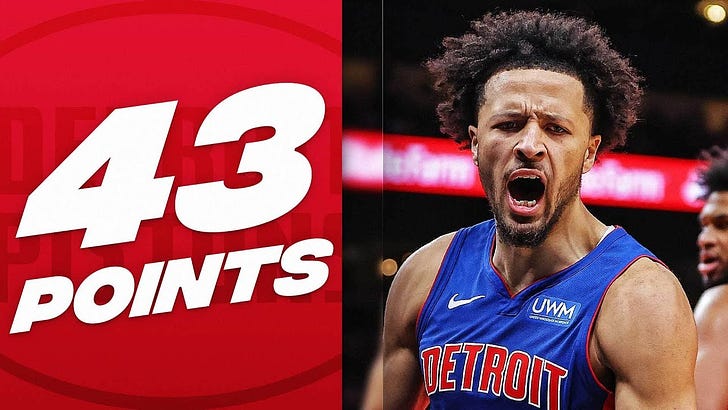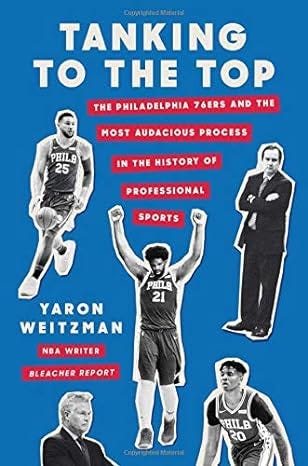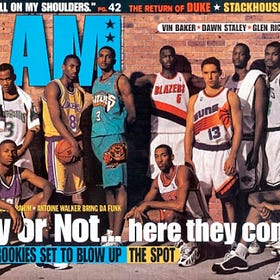The Remarkable Futility of the Detroit Pistons
An otherwise unremarkable, Thursday night matchup between the Detroit Pistons and Utah Jazz is noteworthy for the potentially historic implications. A Pistons loss marks their 25th straight of the 2023-24 campaign, moving Detroit into second all-time for most consecutive losses in the same season and third for total defeats in a row.
This NBA season has been fascinating through the first two months in part for how bad the struggling teams have been. The Pistons have had company in the pursuit of fewer than 20 wins thanks to a young Spurs team lacking depth and a defensively inept hodge-podge of players making up the Wizards.
But even among their fellow flounderers, the Pistons are exceptionally bad. Case in point, on Dec. 15 when Washington snapped a lengthy skid with a 137-123 defeat of Indiana and San Antonio bested the Lakers, 129-115, Detroit lost to Philadelphia, 124-94.
The Pistons lost to Milwaukee the very next night, 146-114.
As woeful as each is, both Washington and San Antonio have won twice as many games as the Pistons. Compounding Detroit’s misery is how utterly directionless it's march to being among the worst teams ever in the NBA feels.
Detroit’s place among the most prolific losers in NBA history speaks to common criticism of the modern-day league: Four of the five longest skids have occurred since the 2010s.
Three of the four teams that hold this dubious distinction are also reflective of some of the more regular complaints detractors cite about NBA management. The 2010-11 Cleveland Cavaliers and their 26 straight losses, tied for most in a single season, were a direct result of so-called super-team formation.
LeBron James’ departure to partner with Dwyane Wade and Chris Bosh in Miami caught Cleveland brass without a back-up plan.
The result was a Cavaliers roster in which Antawn Jamison, acquired midway through the previous season with the intent of complementing LeBron in pursuit of a championship, became Cleveland’s only player to average more than 14 points per game.
Philadelphia’s two separate runs of historic futility, when it lost 26 straight in the 2013-14 season and 28 from the end of the 2014-15 campaign into the following season, were part of “The Process.”
NBA decision-makers have en masse adopted a policy of intentionally putting out the least competitive rosters possible for an extended period of time in pursuit of more favorable draft picks.
Basketball fans know this as tanking, and it’s not uncommon to read laments from commentators and fans alike that any team not immediately contending for a championship should be tanking.
It’s an utterly backwards way of viewing sports and it’s hardly proven effective, yet belief in tanking borders on cult-like. Case in point, there’s an entire, 300-page book dedicated to Philadelphia punting on most of the 2010s entitled Tanking to the Top.
The book’s existence, when Philadelphia has yet to reach even an Eastern Conference Finals as a result of this philosophy, strikes me as utterly preposterous. But that’s just how a lot of NBA punditry views the league.
Then, there are these Pistons. Detroit has struggled consistently since its 2000s championship window with leaders Chauncey Billups, Rasheed and Ben Wallace, Tayshaun Prince and Rip Hamilton closed commensurate with an exit from the 2008 Eastern Conference Finals.
The Pistons returned to the Playoffs just twice since 2009, never advancing past the first round, and finished with a record better than .500 only once.
Detroit didn’t fall apart as the result of losing a superstar to free agency — mostly because a superstar hasn’t worn a Pistons uniform since Grant Hill.
Now, that time frame obviously encompasses the mid-2000s when the Pistons won a Finals and very nearly repeated, then produced the NBA’s best regular-season record over a three-year span.
But while none of Billups, either Wallace or Hamilton were superstars in the traditional sense, all were unique talents who brought a different piece to the puzzle. Ben Wallace is among the greatest interior defenders of all-time, and was selected to the Hall of Fame as a result.
Detroit hasn’t been able to construct a roster comparable to that in the 15 years since. And, in the organization’s defense, it’s an outlier lineup among all-time Finals winners.
The Pistons also haven’t had another burgeoning star, however, despite more than a decade of sub-.500 finishes producing 14 first-round picks since 2009, nine of whom were selected in the top 10.
It’s fair to deem the jury still out on at least three of those nine top 10 draftees: 2023 No. 5 pick Ausar Thompson, 2022 No. 5 selection Jaden Ivey and 2021 top-overall pick Cade Cunningham.
Cunningham in particular has emerged from a rash of injuries that kept him out his first two years in the NBA to show potential for true excellence. Cunningham could very well be the building block for Detroit’s future, but that’s going on the assumption there’s a blueprint the Pistons front office is following.
Detroit’s sustained lack of success doesn’t have the ear-markings of tanking; not in the sense Philadelphia employed the strategy, anyway. If there’s a strategy in place at all, it’s lost on me, in part because of how badly the Pistons have regressed from signs of marginal growth two years ago.
After consecutive 20-win seasons in 2019-20 and 2020-21, the 2021-22 Pistons emerged as a low-key League Pass pleasure of mine. The primary joy I find in subscribing to the NBA’s all-encompassing broadcast package is in pinpointing up-and-coming or breakout teams. Last year’s Orlando Magic became a favorite of mine, and seeing them thrive in 2023-24 thus far as been a delight.
While the ‘22 Pistons improved to only 23 wins that season, a young roster that offered a variety of skill sets made it a fun team to check out.
Saddiq Bey showed potential as a sharpshooting 3-point specialist. Isaiah Stewart offered glimpses of developing into the kind of hard-nosed, interior banger around which past great Pistons teams built. Jerami Grant was never going to be the top player for a contending team, but his role as the reliable veteran leader of a Detroit kiddie corps suggested he could be a glue guy for a contender in the vein of his uncle, Horace Grant.
But the Pistons shipped Grant to Portland for:
future second-round picks
a Milwaukee first-round pick likely to be so deep in the first round as to be the caliber of a second-rounder
the rights to Italian prospect Gabriele Procida, who may or not may not ever make it to the NBA — and, if he does, brings a profile that reads like a Brand-X version of Cade Cunningham
Detroit shipped off Bey last season in a deal that brought in James Wiseman from Golden State. The No. 2 overall pick in 2020, Wiseman’s tumultuous tenure as a Warrior led to plenty of finger-pointing at Steve Kerr from Bay Area media for not using the rangy forward.
He doesn’t play much in Detroit, either, logging 14 minutes, 7.1 points and 4.2 rebounds per game. Bey, meanwhile, is scoring 12.9 points and grabbing 6.2 rebounds per game in a spark-plug role for the Hawks.
But the most peculiar move, and the one that singled Detroit isn’t in tanking mode so much as just lost in the woods, was the acquisition of Bojan Bogdanovic.
Signing a then-32-year-old Bogdanovic to a $39 million contract was a quizzical decision for a young roster, particularly when it meant shipping off then-22-year-old Saben Lee after he had glimmers of promise with the Pistons.
Bogdanovic has been Detroit’s second-best player behind Cunningham much of this season, while Lee has played only 29 NBA games since being traded from Detroit. But the age and price tag differential between the two, even with Kelly Olynyk as part of the deal, doesn’t make sense from any roster-building perspective.
Another top five lottery pick is in Detroit’s future. However, the 2024 class doesn’t appear particularly strong. Plus the Pistons’ whiffs on first-rounders going back as far as the championship era of the 2000s — when they selected Darko Milicic at No. 2 in what rivals 1984 and 1996 as the greatest draft classes of all-time — doesn’t inspire a ton of confidence in a turnaround any time sooner.
Cade Cunningham provides some hope, emerging as one of the better players from a 2021 draft class that’s fast making a case as one of the league’s all-time greats.
But from the previous year’s class, which featured Anthony Edwards, LaMelo Ball, Tyrese Maxey and Tyrese Haliburton as budding stars with Obi Toppin and Cole Anthony as dependable rand still progressing ole players, Detroit has Wiseman and Killian Hayes, the latter a Pistons pick who has regressed notably in the last two seasons.
The 2020-2021 NBA Rookie Class is Special In Its Own Way
The above SLAM pullout cover is iconic for an pro basketball fan, but especially those of us who grew up on ‘90s hoops and had this collector’s edition poster on our bedroom walls. Last night while watching Anthony Edwards go for 42 points, which included an 8-of-9 3-point shooting performance; and seeing Desmond Bane sink two critical 3-pointers in th…
This unintentional pursuit of historic futility is sad to see not just due to Detroit’s seeming lack of a plan, but because of the organization’s overall history. Detroit is a great basketball city, and the Pistons are among the NBA’s oldest franchises.
No fan base deserves to endure such a bleak stretch, but it’s especially unfortunate for a loyal base committed to a long-tenured franchise. Detroit’s current struggle is comparable in that way to that of the Chicago Blackhawks during their dismal late 1990s to late 2000s.
Chicago turned things around in short order behind young, breakout talent, however, and won a Stanley Cup in 2010. The alternative is the Pistons’ plight being the NBA equivalent of the Pittsburgh Pirates — a historic organization with rich history, loyal fans, and a rudderless internal strategy that yields perennial failure.





